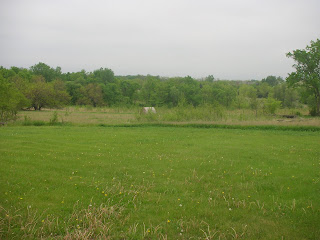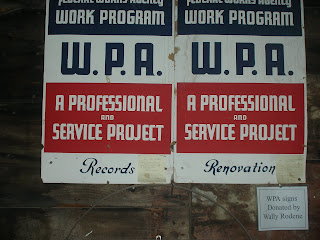Monday, June 20, 2011
Disaster Work
Yesterday, I got back to Pawnee City around 9:30 pm. We came back from doing some disaster relief work. We spent Saturday and Sunday canvassing blocks of houses in Council Bluffs, Iowa, which is near the border between Iowa and Nebraska.
By canvassing, I mean that we went from house to house, informing folks about the developing flood situation along the Missouri River. Here was my basic spiel:
Hi, my name is David and I’m with the Americorps NCCC. I’m volunteering today with the Iowa Department of Human Services. We’ve been canvassing this whole block, letting folks know about the developing flood situation. Right now, we are on a Level 1, which means that no formal evacuation order has been issued. Right now it’s about self-evacuation, if you choose to, and preparing in advance in case anything worse happens. Make sure to watch the news, read the paper, listen to the radio for any updates. You can also call the 800 number on the back of this white sheet for more up-to-date information about the floods. Thanks for your time.
This was my first taste of disaster work. It was pretty tiring waling many flocks for 4-5 straight hours. But it was also important work that needed to be done. The emergency director spoke to the importance of the work when she was “training” us before we set out on our houses. Apparently, in Council Bluffs, 50% of the residents don’t subscribe to a newspaper. And about the same a mount didn’t even know a flood was occurring—actually after walking the community and talking to folks, I think everyone was pretty much aware of what was going on. Nonetheless, people had to know. The director spoke about us not trying to worry people. It would make the situation a whole lot worse if people were panicking. It would probably just be chaos. I thought it was great that a bunch of Americorps volunteers were going door to door. We are all part of the Council Bluffs community (at least for a day) and it’s the community members that should be informing each other and addressing any concerns.
There were probably a few scenarios that occurred repeatedly as I spoke to different people:
There was the couple that said, “They (my partner and I) aren’t going to tell us anything that don’t want us to know.” They were referring to how we said, “we don’t know that info,” when they would ask more detailed questions like “are your sure we’re on Level 1” and “what are the corps engineers really doing.” I truly didn’t know that info. But at the same time, the director said that we should say to call the 800 number because we didn’t want to hand out any wrong info or start any rumors. To the couple, I probably represented all that is wrong with government bureaucracy. I was probably hiding the truth about how bad the situation could really get. I did indeed hate telling folks to call the 800 number for more info. It would’ve been nice to discuss with them what the papers were saying and to try to determine the “truth” so to speak. Afterall, isn’t that what community members, citizens should be doing? However, I also needed to do my job. And I didn’t want to hand out info that was wrong and give people the wrong perception of things. And I do see the importance of trying not to stir up people’s nerves.
There was one guy who told me that he was almost finished paying the mortgage on his house but that the insurance he bought was no good. (I think he might be referring to how FEMA is not allowing any flood insurance bought after May 1 to apply for this current flooding along the Missouri). When he told me this, all I could say was that “I’m sorry to hear that.” While I was the bearer of bad news, he knew I was just doing my job. We ended our conversation by him saying that he was hoping for the best.
Another woman thought I was giving her an order to evacuate—it didn’t help that some of the forms we were handing out were pink. But I reassured her that no formal evacuation order had been issued. At this news, she was relieved and said I almost brought her to tears when I was at the door. She was probably in her later 30s but she also looked like she might have a disability. So it would’ve been hard for her to just pack up all of her stuff and move.
Then there were a few folks who told me that the river wouldn’t go over and that the levees would hold. I’m not quite sure what was going through these people’s minds. Based on reading the papers and seeing the images, it seemed imminent that flooding was going to occur. Couldn’t they, even just in case, pack some of their valuables and prepare just a little bit? Instead, they seemed stubborn, thinking that nothing was going to happen.
Prior to going out into the neighborhood, the emergency director made it known that the area was a lower income area. There were a lot of elderly folks and younger adults. Walking through the community, it seemed more of a working class community. In fact, some streets reminded me of Richmond, CA. But other streets reminded me of Montebello, CA—nice, well-kept one-story houses. There was one part of Council Bluffs, though, that you could visibly tell was poorer—the trailer houses right next to the railroad tracks. It was also the neighborhood where I saw a few people of color—a couple of Latino men and a couple of API folks. Still, this area was still mainly white. As I was walking these streets, I thought what would happen if the water reached these folks. Supposedly according to the map, they were near a “ravine,” which also meant they were the nearest to the river. If that is true, it is inevitable that they would lose their homes. I’m not sure if it would actually happen. But it would totally suck if they lost the few possessions that they own.
Canvassing is a tiring job. By the time you’re done hitting your houses, your legs and feet are tired and your voice may be alittle bit weaker. But I think the more chances I get to do it, the more I’ll get used to it. And if that’s what it takes to help folks prepare for a disaster or emergency, I’m all for it. My first taste of disaster work was pretty good. I’d like to try canvassing again. Who knows, we might even be called to do it again considering that the Missouri River levels keep on rising.
As a last thought, as I was canvassing, I thought about what would be the most effective way for people to know and prepare for a disaster. Canvassing probably isn’t the most efficient or quickest way to inform people. It would help if everyone watched the same news channel and got the same up-to-date information. But that isn’t really a reality. So canvassing is probably one of the better ways. Then, I would hope that all canvassing should happen in a timely manner to give people enough time to do what they got to do to ensure their well-being.
Peace,
David
Tuesday, June 7, 2011
Sunday, June 5, 2011
6/5/11
What’s Happening Everyone,
It’s been awhile since my last post, so I got to catch ya’ll up on some things.
My team and I have been in Pawnee City, Nebraska for the last two weeks and we’ve been working at the Pawnee City Historical Society. So far, we’ve scraped, primed, and painted two buildings and are in the process of priming a third building. It’s been good work—a lot more physical than our last project as camp counselors in MI. It’s true that it can get monotonous doing the same few tasks everyday from 8:00 am to 4:30 pm. I’ve been either scraping paint off the exterior walls of old schoolhouse, priming those scraped walls, or applying the top coat of paint to those primed walls. I’ve spent whole days just scraping or just painting. And I’ve probably spent a couple days total on ladders—extension and step ladders. It is good work, though. It has definitely given me the confidence to be more DIY when I get home. I feel like I’ve figured out methods of painting and scraping that work and don’t work. Another thought that has come into my head while performing this work is that our project sponsor believes enough the quality of our work that she is willing to have a volunteer group of 10 young folks renovate her buildings. You can’t help but want to do a good job and hold yourself to high standards.
Pawnee City is a pretty small city; in fact, in the last couple of years the population has dropped from 1200 to about 800. Most of the folks who live here are elderly. There is not a whole lot to do in the surrounding area since it is mostly farms around us. And it has taken some getting used to. I’ve only been here two weeks but it really does feel more like a month. At the same time, I don’t mind. The lack of major tourist attractions or venues gives me a chance to do some reading. Aside from reading, most of my time has been spent exercising, playing some basketball with my teammates, and watching moves with them too. Haha, for some reason, most of the movies we’ve watched have been romantic comedies.
Last week for Memorial Day, my team and I helped set up an “Avenue of Flags” at the county courthouse. We helped set up flag poles and American flags. There was a reverent mood in the air. I know that I for sure was afraid to drop the flags on the ground or to make any mistake. Although it was kind of stressful setting up the flags, it was really a nice site to see after we and the other community volunteers were done. Nebraska has been having some pretty heavy winds recently. Just picture about 75 American flags blowing perfectly in the wind. I’ve never seen anything like it.
Next up, the bison farm. Tomorrow, my team and I are going to be visiting a local bison farm. We’ll see if it’s possible to ride one of them. I’ll let you folks know how it goes.
Til next time,
David
Subscribe to:
Comments (Atom)



























